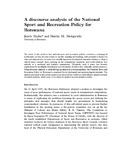| dc.contributor.author | Shehu, J. | |
| dc.contributor.author | Mokgwathi, M.M. | |
| dc.date.accessioned | 2010-06-21T10:56:36Z | |
| dc.date.available | 2010-06-21T10:56:36Z | |
| dc.date.issued | 2007 | |
| dc.identifier.citation | Shehu, J. & Mokgwathi, M.M. (2007) A discourse analysis of the national sport and recreation policy for Botswana, Sport, Education and Society, Vol. 12, No. 2 pp. 193-210 | en_US |
| dc.identifier.issn | 1357-3322 | |
| dc.identifier.uri | http://hdl.handle.net/10311/524 | |
| dc.description.abstract | The thesis of this article is that national sport and recreation policies constitute a pedagogical
problematic, as they are texts bound to specific meaning and learning, with potential to impact on
roles and subjectivities. As such, it is crucially important for physical education scholars to adopt a
critical stance towards them, opening up the assumptions, intentions and social relations they
embody to a profound and sensitive engagement. Ultimately, such a stance has broader
implications for intelligible formulation and translation of polices into culturally sensitive practice.
Using discourse analysis, a methodology grounded in poststructuralism, the National Sport and
Recreation Policy for Botswana is examined for its ideological and epistemological rationale. The
analysis presented in this article underscores the need for a reflective and reflexive attitude towards
recreation policies, which seem to be taken for granted in postcolonial societies. | en_US |
| dc.language.iso | en | en_US |
| dc.publisher | Routledge. http://www.informaworld.com | en_US |
| dc.subject | National sport and recreation policies | en_US |
| dc.subject | Physical education scholars | en_US |
| dc.subject | Botswana | en_US |
| dc.title | A discourse analysis of the national sport and recreation policy for Botswana | en_US |
| dc.type | Published Article | en_US |

